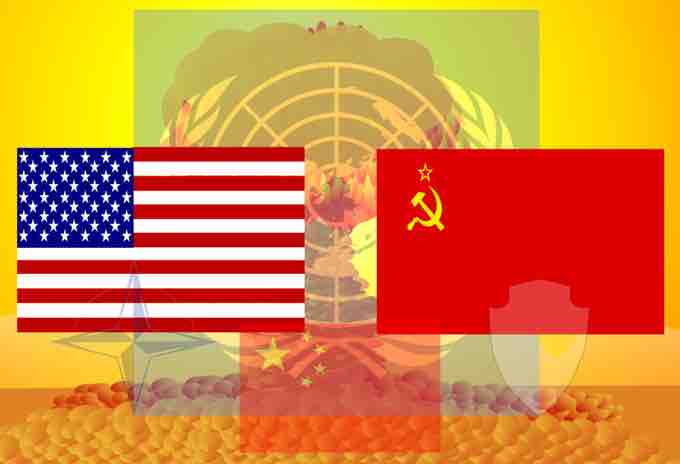A Bipolar World to a Unipolar World
The legacy of the Cold War continues to influence world affairs today. After the dissolution of the Soviet Union, the post-Cold War world became widely considered unipolar instead of bipolar, with the United States the sole remaining superpower. The Cold War defined the political role of the United States in the post-World War II world: by 1989, the U.S. held military alliances with 50 countries and had 1.5 million troops posted abroad in 117 countries. The Cold War also institutionalized a global commitment to large-scale and permanent peacetime military-industrial complexes, as well as the large-scale military funding of science.

Cold War Flags
The legacy of the Cold War continues to influence world affairs. After the dissolution of the Soviet Union, the post-Cold War world is widely considered unipolar, with the United States the sole remaining superpower.
Costs: Financial and Human Life
Because the two superpowers carried much of the confrontational burden, both Russia and the United States ended up with substantial economic liabilities. Military expenditures by the U.S. during the Cold War years were estimated to have been $8 trillion, while nearly 100,000 Americans lost their lives in the Korean and Vietnam Wars. Although the loss of life among Soviet soldiers is difficult to estimate, as a share of their gross national product the financial cost for the Soviet Union was far higher than that of the U.S.
In addition to the loss of life by uniformed soldiers, millions died in the superpowers' proxy wars around the globe, most notably in Southeast Asia. Many of the proxy wars and subsidies for local conflicts ended along with the Cold War, and the incidence of interstate, ethnic, and revolutionary wars, as well as refugee and displaced persons crises, has declined somewhat in the post-Cold War years. However, many of the political issues begun during the Cold War years continue today.
Political Legacies
The legacy of Cold War conflict continues today, as many of the economic and social tensions that were exploited to fuel Cold War competition in countries throughout the Third World remain acute. The breakdown of state control in a number of areas formerly ruled by Communist governments has produced new civil and ethnic conflicts, particularly in the former Yugoslavia. In Eastern Europe, the end of the Cold War has ushered in an era of economic growth and a large increase in the number of liberal democracies, while in other parts of the world, such as Afghanistan, independence was accompanied by state failure.
In the wake of the Cold War, nations freed from colonial forces and newly founded nations inherited expenses, commitments, and resources for which they were not prepared. The successor states also found themselves with contemporary national-security burdens, all to be financed while new or revised civilian economies had to be instituted.
Nuclear Legacies
Benefits
Many specific nuclear legacies can be identified from the Cold War. Some are benign, such as the availability of new technologies for nuclear power and energy and the use of radiation for improving medical treatment and health. Environmental remediation, industrial production, research science, and technological development have all benefited from the carefully managed application of radiation and other nuclear processes.
The international non-proliferation regime inherited from the Cold War still provides disincentives and safeguards against national or sub-national access to nuclear materials and facilities. Formal and informal measures and processes have effectively slowed national incentives and the tempo of international nuclear-weapons proliferation.
Concerns
On the other hand, despite termination of the Cold War, military development and spending has continued, particularly in the deployment of nuclear-armed ballistic missiles and defensive systems. Because there was no formalized treaty ending the Cold War, the former superpowers have continued to various degrees—depending on their respective economies—to maintain and even improve or modify existing nuclear weapons and delivery systems. Moreover, other nations not previously acknowledged as nuclear-weapons states have developed and tested nuclear-explosive devices. Because of potential risk to national and international security, nuclear-weapons states have inherited substantial responsibilities in protecting and stabilizing their nuclear forces. Risks of deliberate, accidental, or unauthorized nuclear devastation remain.
Public Insecurity
Public impressions and insecurities gained during the Cold War also carry over today. Strong impressions were made and continue to affect national psyche as a result of perilously close brushes with all-out nuclear warfare. In some cases, this had resulted in aversion to warfare, while in other cases to callousness regarding nuclear threats. Peaceful applications of nuclear energy received a stigma still difficult to exorcise. Heightened fear of nuclear risk can result in resistance to military drawdown.